Key takeaways:
- Pro-life advocacy emphasizes valuing life from conception to natural death, aiming to support mothers and provide resources for unexpected pregnancies.
- Honesty in discussions fosters genuine understanding and trust, creating safe spaces for sharing vulnerabilities.
- Leading by example and creating non-judgmental environments encourage others to express their honest perspectives.
- Navigating challenges in sensitive discussions requires patience, empathy, and the ability to set boundaries for respectful exchanges.
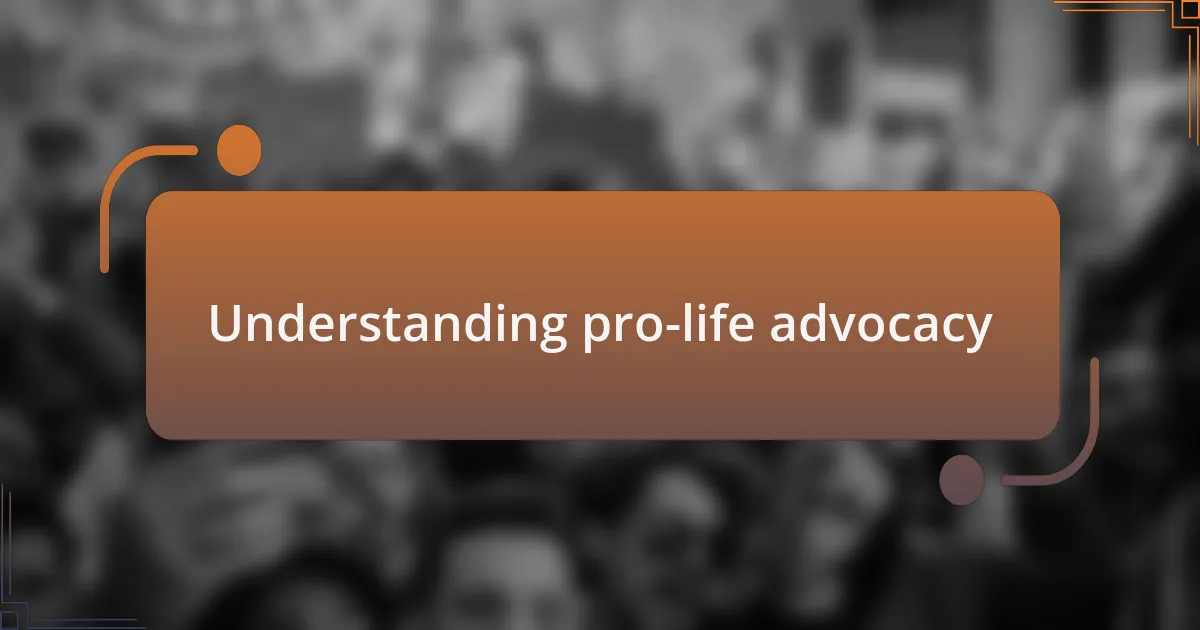
Understanding pro-life advocacy
Pro-life advocacy is rooted in the belief that every human life, from conception to natural death, holds inherent value. I remember attending a local rally where a mother shared her story of choosing life despite immense challenges. Her courage spoke volumes about the narratives often overshadowed in this discourse.
This movement is not just about opposing abortion; it’s about fostering a culture that explicitly values life, supporting mothers, and offering alternatives during crises. Have you ever thought about the emotional weight carried by those faced with unexpected pregnancies? I’ve witnessed firsthand the relief on a woman’s face when she learns about resources available to help her navigate such difficult situations.
At its core, pro-life advocacy seeks to create a society that celebrates life in all its stages. This perspective challenges us to reflect on our commitments and how we can compassionately assist others. I often think about how each interaction can shift someone’s view and contribute to a greater understanding of life’s sanctity.
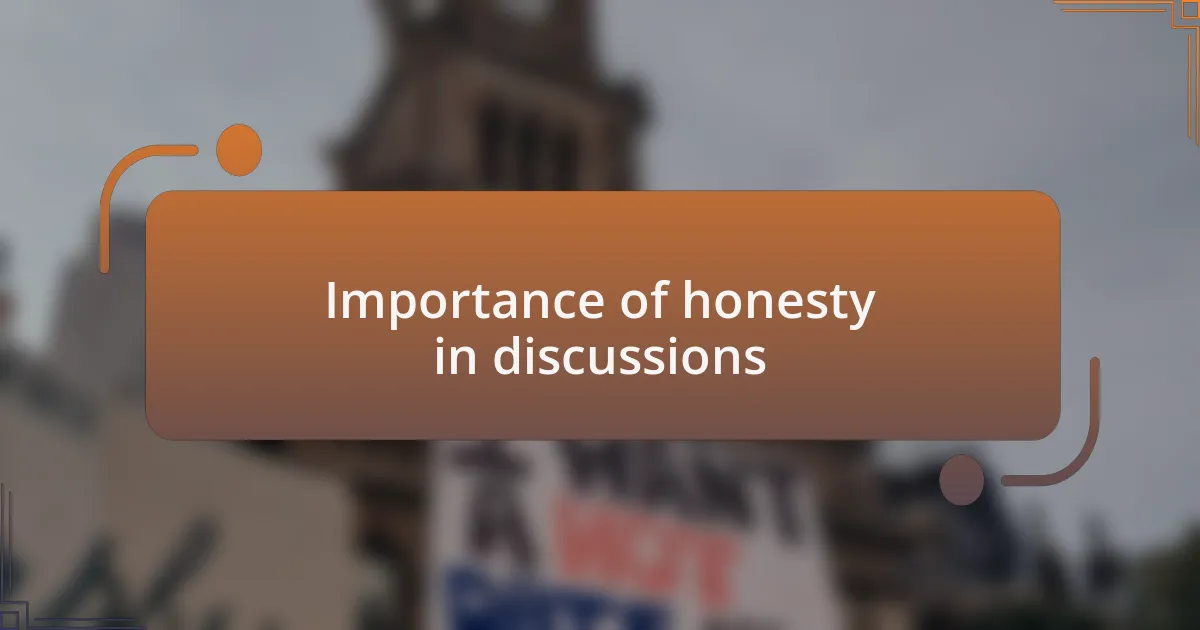
Importance of honesty in discussions
Honesty in discussions is crucial because it fosters genuine understanding and trust among participants. When I share my views on pro-life issues, I find that being transparent about my beliefs encourages others to open up as well. Have you noticed how a straightforward conversation can lead to deeper connections?
In my experience, when discussions are rooted in honesty, they create safe spaces for sharing vulnerabilities. I recall a moment where a participant opened up about their past experiences with loss and regret. That raw honesty shifted the entire dialogue, paving the way for empathy and shared learning—something that could easily be lost without a truthful exchange.
Moreover, honesty allows us to address sensitive topics head-on, breaking down misconceptions. I remember a heated debate where someone boldly admitted they didn’t fully grasp the implications of certain choices. That kind of candidness is rare and valuable; it shows a willingness to learn and engage. In the end, isn’t that what we all hope for—to communicate openly and with authenticity?
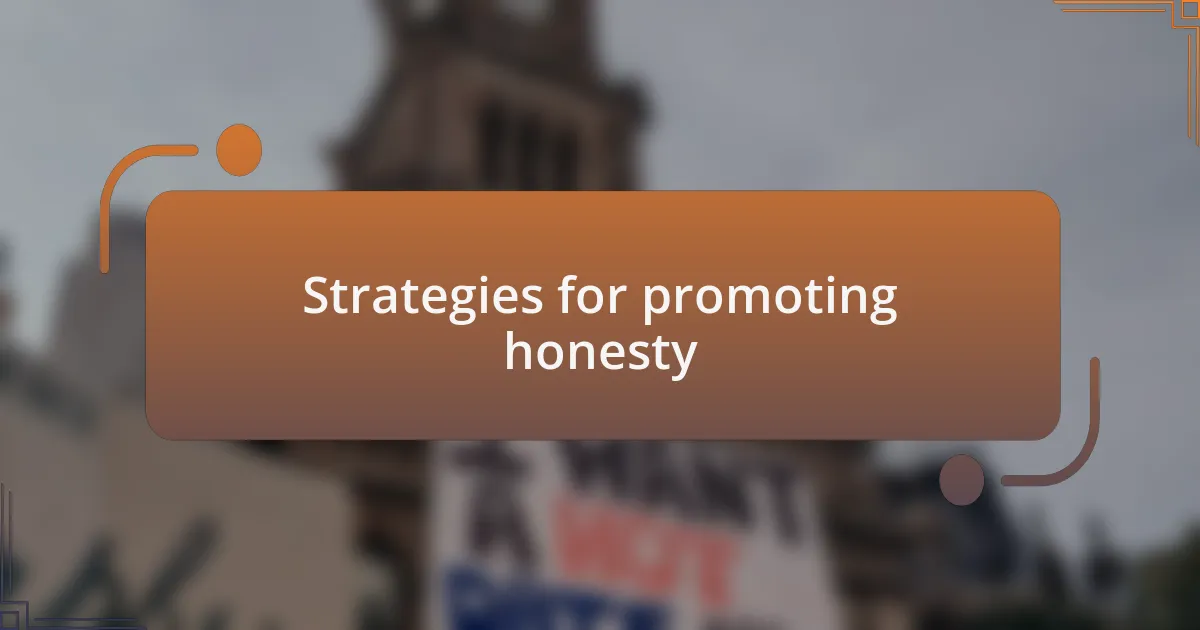
Strategies for promoting honesty
One effective strategy for promoting honesty is to lead by example. When I openly share my own uncertainties and experiences about pro-life issues, I’ve often noticed others feel emboldened to do the same. Have you ever felt a conversation shift when someone admits their struggle with a complex topic? It’s almost like an invisible barrier comes down, allowing for genuine exploration.
Creating a non-judgmental environment is also key. I remember facilitating a discussion where participants were encouraged to express their feelings without fear of backlash. One individual shared a deeply personal story that caught many off guard, yet it opened the floor for a heartfelt conversation about fears and hopes surrounding unexpected pregnancies. This taught me that honesty thrives in spaces where vulnerability is welcomed.
Another strategy is to ask open-ended questions that invite deeper introspection. During a recent discussion, I posed a thought-provoking question about the personal impact of abortion on individuals and families. The resulting dialogue was rich and multilayered, as participants reflected on their views. Don’t you find that thoughtful questions can lead to richer, more honest interactions? It’s a simple yet powerful technique that can transform a conversation.
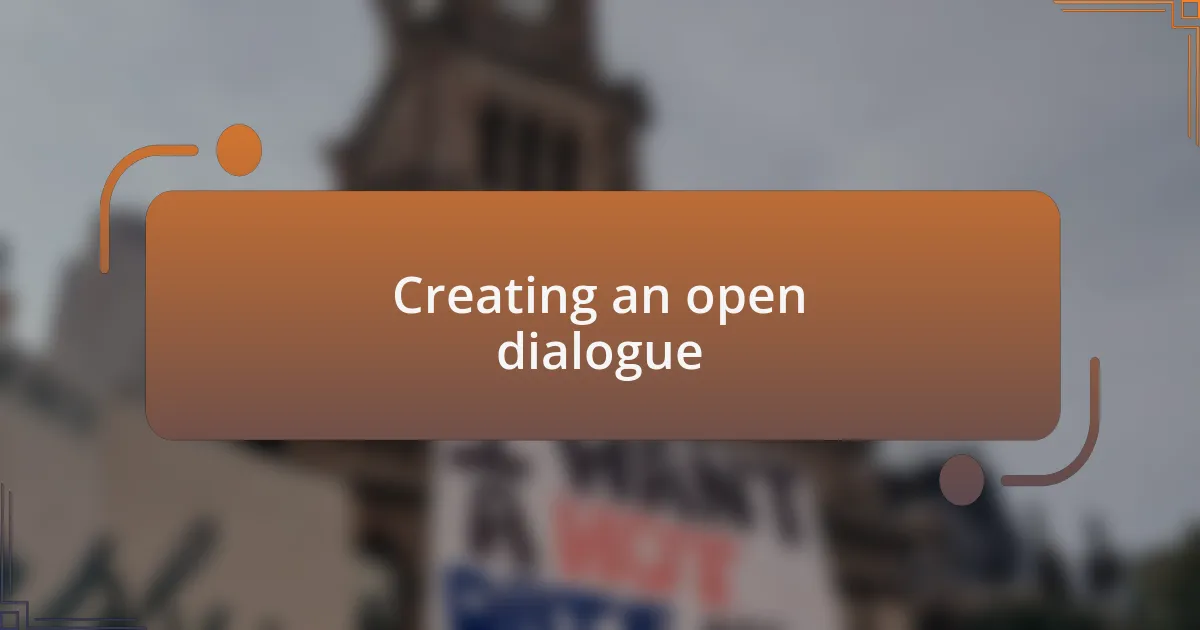
Creating an open dialogue
Creating an open dialogue requires a foundation of trust. In one of my early advocacy meetings, I realized how crucial it was to create a space where everyone felt safe to voice their thoughts. A simple icebreaker where we shared our reasons for being pro-life turned into an unexpected moment of connection. Have you ever noticed how shared motivations can unite a group, making it easier to engage in difficult discussions?
I find that active listening plays a vital role in fostering open dialogue. During a recent conversation with a group divided on pro-life views, I made it a point to reflect back what I was hearing, even if I disagreed. This simple act not only showed respect but encouraged others to open up more fully. Don’t you think that when people feel heard, they are more inclined to share their honest perspectives?
Furthermore, I strive to acknowledge differing opinions without dismissing them outright. I recall a heated discussion where one participant expressed strong views against pro-life stances. Rather than countering immediately, I asked them to elaborate on their experiences. This approach not only diffused tension but also enriched the conversation, allowing me to learn from their viewpoint. Isn’t it remarkable how embracing differing perspectives can lead to deeper understanding and honesty?
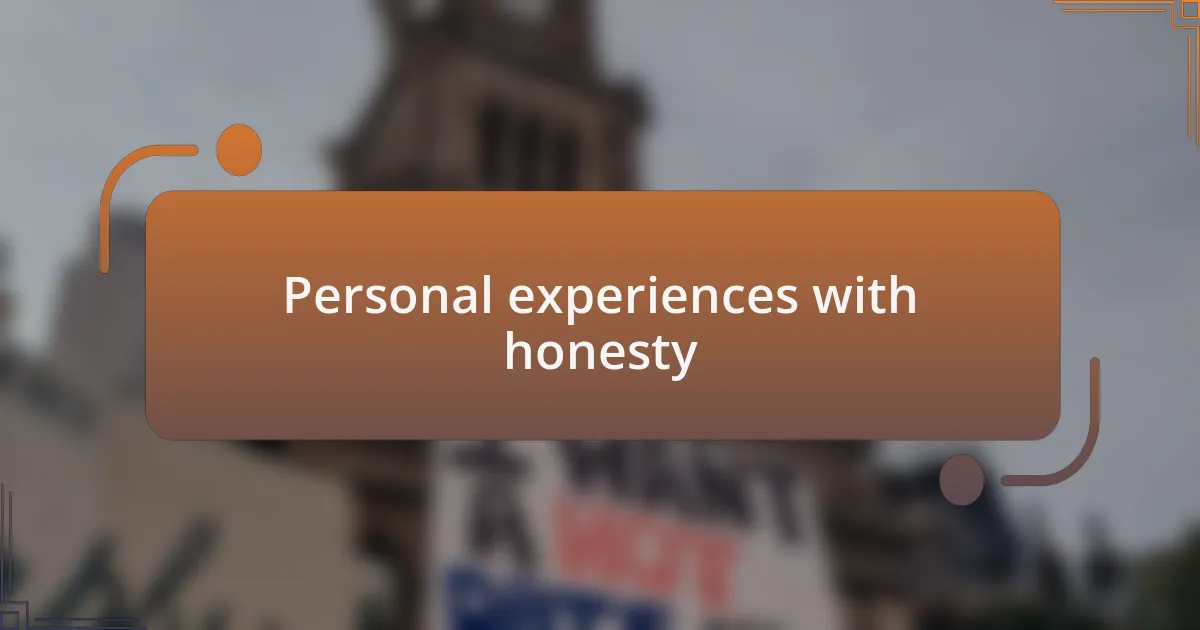
Personal experiences with honesty
In my experience, honesty has often emerged in the most unexpected moments during discussions. I recall a time when a fellow advocate shared a deeply personal story about her previous experiences with regret after an abortion. Her vulnerability opened the door to a more profound dialogue, compelling others to reveal their own struggles and fears. Have you ever witnessed how one person’s honesty can create a ripple effect, encouraging others to come forward with their truths?
Another memorable encounter happened when I was facilitating a workshop on pro-life advocacy. I encouraged participants to write anonymous questions on index cards, which I would address without revealing their identities. The candid inquiries ranged from personal dilemmas to philosophical beliefs. The honesty in those questions not only reflected the participants’ trust in the process but also highlighted the necessity of addressing uncomfortable yet essential topics. Wouldn’t you agree that anonymity can sometimes allow for a greater depth of honesty?
There was also a time when I made a misstep by unintentionally misconstruing another advocate’s view during a discussion. Instead of letting pride get in the way, I admitted my misunderstanding and apologized. This honesty not only restored trust but also set a precedent for others to be forthright about their own mistakes. In the end, I realized that embracing vulnerability is a strength, not a weakness. Have you found similar moments where honesty has shaped the outcome of a conversation?
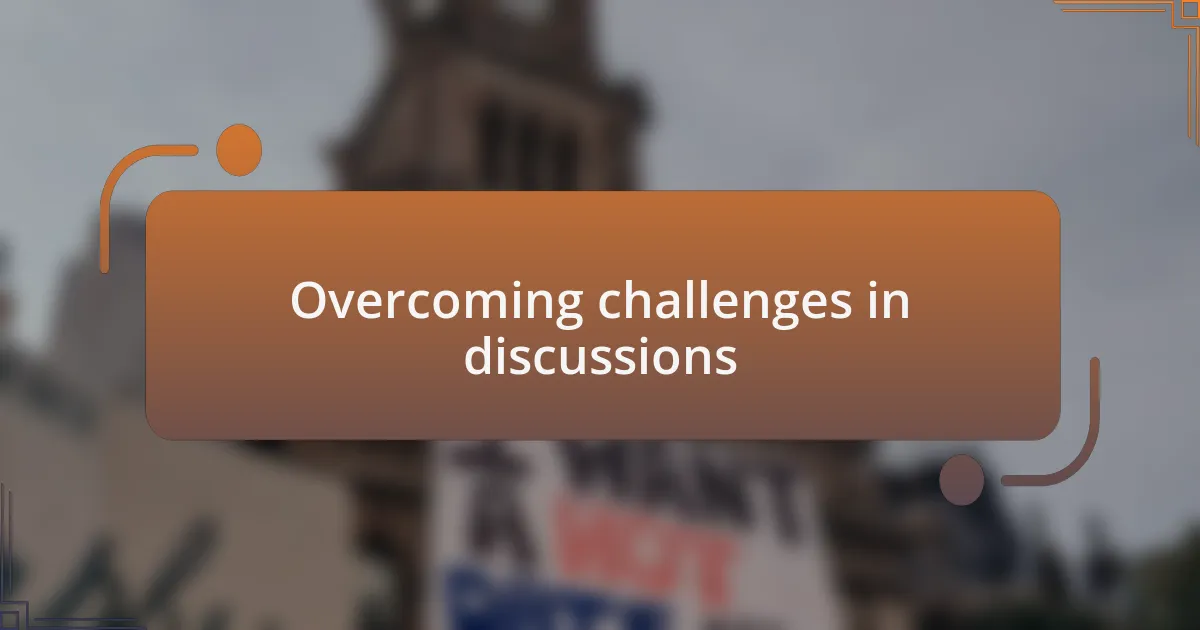
Overcoming challenges in discussions
Engaging in discussions about sensitive topics like pro-life advocacy can present significant challenges. I remember a particularly intense debate where emotions ran high, and participants were quick to dismiss opposing views. In that moment, I had to remind myself of the importance of patience and empathy. How can we expect honesty to flourish if we’re not willing to listen? I decided to pause the conversation, asking everyone to reflect on why they felt so passionately. This shift prompted many to articulate their thoughts more thoughtfully, creating space for honesty to emerge.
Sometimes, I encounter participants who are hesitant to be open, fearing judgment or backlash. In one instance, a young advocate expressed concern about sharing her viewpoint on a controversial issue due to her age and perceived lack of experience. I shared my own early days of advocacy, where I too felt intimidated. Encouraging her to speak up not only emboldened her but also helped others recognize that vulnerability can be a powerful catalyst for deeper dialogue. Isn’t it intriguing how shared experiences can break down barriers?
Navigating discussions also means recognizing when to set boundaries for respectful exchanges. I had a conversation that veered off course into personal attacks, which was disheartening. Instead of allowing the negativity to persist, I intervened calmly, suggesting we refocus on the crux of the conversation. This act of standing up for respectful discourse ended up being a turning point, allowing participants to feel safe in sharing their honest perspectives. Isn’t it remarkable how creating an environment of respect can unlock honesty?
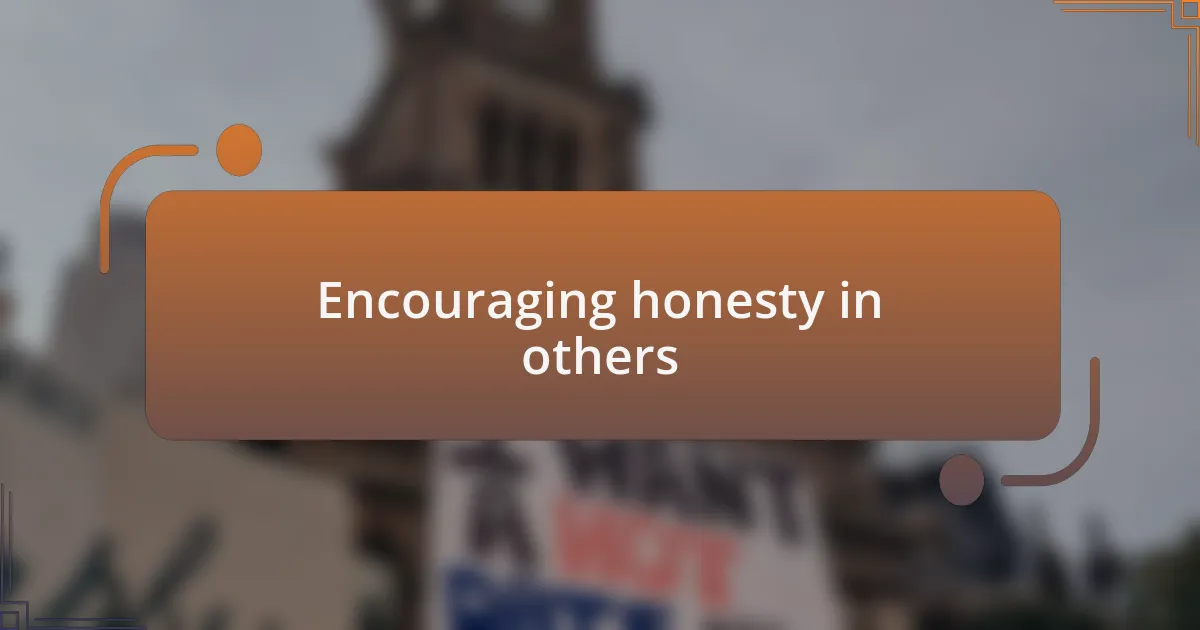
Encouraging honesty in others
Encouraging honesty in others often starts with leading by example. I recall a time when I openly admitted to my uncertainties about a specific pro-life argument during a group discussion. My admission not only alleviated the pressure on others but also prompted them to share their hesitations as well. Have you noticed how vulnerability can create a ripple effect, encouraging those around you to speak their truths?
Creating an atmosphere where honesty thrives sometimes means addressing the fears people have about sharing their honest thoughts. In one memorable conversation, a peer expressed apprehension, worried their perspective would be met with disapproval. I made it a point to vocalize my appreciation for differing viewpoints, reinforcing that diversity of thought only enriches our discussions. Isn’t it powerful to consider that acknowledging fear might be the key to unlocking someone’s honesty?
It’s essential to ask open-ended questions that prompt reflection rather than defensiveness. I’ve often found that questions framed with curiosity facilitate deeper conversations. For instance, during a dialogue about personal beliefs, I asked a participant, “What experiences shape your view on this topic?” This simple question opened the floor for meaningful dialogue. Doesn’t it strike you how a well-timed question can transform the nature of a discussion, making honesty not just welcomed but necessary?